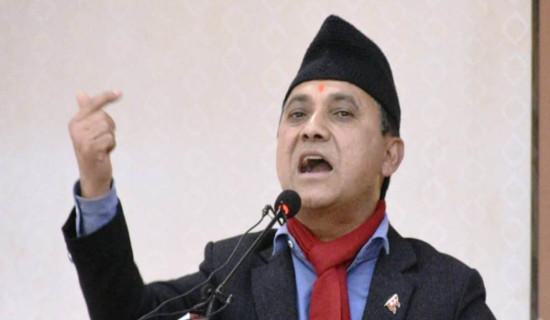- Friday, 16 January 2026
Instil Life Into Public Enterprises
Public enterprises (PEs) are established for the purpose of catering to the needs of the general public. They are designed to fulfil the daily needs of the people at an affordable price, promote healthy competition in the market and make use of available resources. PEs are also designed to create employment opportunities and give a shot-in-the-arm to economic and infrastructure development. Developing backward areas is one of the sacrosanct objectives of PEs. Revenue generation is another objective.
PEs can cover the areas where the private sector cannot step into. The rationale behind the establishment of PEs is varied. First, PEs are established on the socialist model of development with social justice in mind. The state sets up such enterprises so as to control the strategic sectors of the economy. In Nepal, the Nepal Electricity Authority and the Nepal Oil Corporation are a case in point.
Concept
The concept of PEs emerged after World War II to address issues relating to market deficits and capital shortfalls; to promote economic development; to control the national economy; to solve unemployment problems; to provide quality goods and services at an affordable price; and to produce goods and services in a cost-effective manner, among others. In Nepal, the concept of PEs materialised with the establishment of Biratnagar Jute Mills in 1936. The government gave top priority to the establishment of PEs after democracy was ushered into the country in 1951.
The PEs were dominant during the 1960s and 1970s. They were incorporated in the Second Periodic Plan of the country as an important component of the economy. After the reinstatement of the multi-party democracy in 1990, the country adopted a market economy and liberalisation policy. The then existing 12 PEs were privatised in accordance with the Privatisation Act, 2050. But the situation got worse what with anarchic unionism and what with unwarranted political interference. The bitter experience is still rankling.
The PEs are a key component of the economy. However, the state of the PEs in Nepal is miserable, to say the least. The government makes huge investments in the PEs but the returns are far from satisfactory. As per the 60th report of the Office of the Auditor General (OAG), the government invested Rs. 731 billion – Rs. 374 billion in loans and Rs. 357 billion in shares -- in the PEs during the fiscal year 2078/79. Despite such a huge investment, as many as 105 PEs failed to produce any returns. Returns are generally expected from the PEs other than those engaged in the essential service sector. Such loss-bearing PEs have not repaid loans taken from the government. And the government has to bear the burden of losses of such PEs.
The OAG report points out that the PEs are running haphazardly. The PEs do not prepare business plans and the management is also poor. That is why they are in the red. There is political interference in the affairs of the PEs. The unions established for the welfare of the staff work in the interests of political parties. Even top-level executives are appointed on the basis of political affiliation. The PEs are suffering from various other malaises such as lack of autonomy, lack of professionalism and accountability, conflicting goals and financial indiscipline.
The OAG has, therefore, suggested that the goals of the PEs and the present needs be analysed and the PEs be operated, merged or dissolved accordingly. The OAG has also suggested that a policy-level review be made of the PEs by adopting other procedures. In fact, the PEs have become white elephants for the government. However, some PEs are sound and generating returns. Such PEs as Nepal Telecom, Citizen Investment Fund, Nepal Bank Limited, Rastriya Banijya Bank, Agricultural Development Bank, Nepal Stock Exchange and Butwal Power Company are doing well.
Some PEs have not had their books of account audited. Bishal Bazaar Company, Food Management and Trading Company, Rastriya Beema Company and Rastriya Beema Sansthan have remained unaudited for two years, three years, five years and nine years respectively. Such a practice and negligence would raise the question of fiscal discipline. Considering the poor state of most PEs in the country, reform measures need to be taken without delay. First and foremost, the PEs should be de-politicised; no political party should interfere in the management of the PEs. Appointment of top-level executives should be made on a merit basis. Direct political appointment should be avoided as far as possible.
Fiscal discipline
There should be fiscal discipline; all the PEs should have their books of account audited in time. Those employees indulged in corruption or financial irregularities should not be allowed to get off scot-free. The government should form a committee to take stock of the PEs. The PEs can be restructured or reform measures can be taken to improve them. The PEs are a vehicle for economic development of the country. On the one hand, they enable the general public to enjoy goods and services at an affordable price, while on the other they generate revenue for the government. In between, they create job opportunities in the market.
It is estimated that 500,000 graduates enter the job market every year. For lack of job opportunities, most of them are compelled to migrate abroad for employment. The development of the PEs can solve the unemployment problem, to some extent. So the government should play a catalytic role in uplifting the PEs in the country. It is high time the government injected life into the PEs.
(Maharjan has been regularly writing on contemporary issues for this daily since 2000.)
















